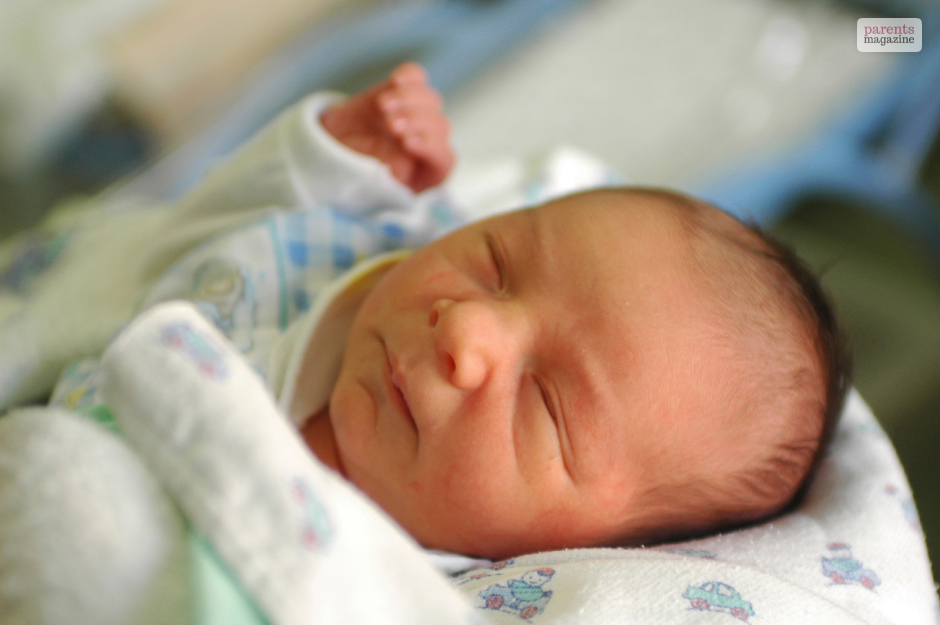
Newborn Grunting And Squirming While Sleeping? What To Know
The amazing jour of motherhood begins from the moment you get to know you are pregnant. But the actual journey starts when to take the little one in your arms for the first time ever. It is a very difficult and challenging task to raise a little one. It is not always a cakewalk. Babies spend most of their time sleeping after they are born, at least the first week. But it is not as peaceful as we use the term “slept like a baby.” They tend to squirm and grunt, and a newborn grunting and squirming while sleeping is nothing unusual. But it can be scary for new parents who have no idea what they are dealing with.
It might seem like they are not comfortable while they are grunting and squirming in their sleep, but it is a very common phenomenon that happens to almost all newborns. It is better to get to know these habits so that you can keep them safe and sound. Also, It doesn’t matter if you are a first-time parent or if this is your second child; knowing their sleeping patterns is necessary.
What Is Grunting And Squirming?

Newborns are not very peaceful sleepers as they squirm and grunt in their sleep, and that is a very common thing among newborns. But these movements, along with the noises they make, often confuse parents. Their neurological system is not developed, and they do not have the maturity t control their movements.
Causes Behind Newborn Grunting And Squirming

There are quite a few things that can cause a newborn to squirm and grunt. When they are struggling with bowel movements, blocked nasal track, acid reflux, and difficulty in taking in oxygen can result in newborn grunting and squirming while sleeping.
Bowel Movements

Difficulty in bowel movement can cause something called “grunting baby syndrome.” This is also known as infant dyschezia. In simple words, they are having difficulty in pooping. They are not familiar with regulating the muscles that are needed to let the waste out of their system. They often use the diaphragm muscles instead of using the muscles in their stomach.
Acid Reflux

As they lie on their backs, they suffer from acid reflux. This happens when the milk travels back into the esophagus from the stomach. And this is accompanied by stomach acid. This is what causes them to breathe heavily and squirm because they get uncomfortable.
Oxygen Intake

This is the time when they are developing their muscles as well. Babies grunt and squirm at night when they are developing their breathing muscles. The breathing pattern change, and they start breathing slowly when they are sleeping; this makes them grunt.
Check on them and see if they are breathing calmly or if there are any signs of stress. If they seem agitated, then it is time you consult a doctor.
Blocked Nasal Track

Some babies grunt when their nose is blocked. Their lungs and nose are tiny, and even a little bit of congestion can make them grunt. If you find them struggling to breathe, do consult a doctor and get them checked.
Hunger

Babies take time to regulate hunger, and when they get hungry at night, they start making weird noises and trigger extra movements. This can become a regular thing if they make it a habit of sleeping before completing their meal. They cannot settle on an empty stomach. It takes time to regulate the circadian rhythm, but hunger can make them grunt in their sleep.
Pass Gas

Along with excretion, they have no idea how to deal with gas. Their body is learning to digest the food, move air and nutrients through the digestive system. This can get uncomfortable, and this is when they make the grunt sound.
It generally takes them a few months to get used to the whole process and learn how to get their muscles relaxed in the pelvic region without making the grunting noise.
Sleep Cycle

Sleep cycles are different for newborns, and they face trouble while transitioning between the sleep cycles. This makes them wake up, squirm and grant, and then fall back asleep. This can be a difficult time for parents but a very normal phenomenon for babies.
Solutions For Newborn Grunting And Squirming While Sleeping

This is not something alarming, but it can disrupt your sleep and get you concerned. Here are some solutions that you can try.
Anal Stimulation
It is not something that parents are recommended. According to research, this makes their learning process slow, and they start spending on stimulation. Apparently, there is no cure for this other than waiting for their muscles to get developed.
Massage

Massaging them can get them relaxed and more comfortable and get them to sleep better. Stroke their body, gently move the joints with your hands, and that can help them relax. Put them on a towel and massage them with a little bit of oil.
Clear The Nasal Track.
It is not a very difficult task to get their nasal tract clean. Get a soft tissue and wipe it across their nostrils, and that can lead to sneezing, which will get their nasal passage to open.
Feeding Adjustment

Try giving them a slightly smaller meal during bedtime, and hold them upright for some time before putting them to sleep. And don’t forget to feed them at night.
Sleeping Environment

The key ingredient for sleeping soundly is comfort. Make sure they are not too tightly wrapped, or they don’t have any loose clothes. Keep the room quiet and dim, and let them rest comfortably.
What Should Concern You?
In general, squirming and grunting are harmless because those are your baby’s way of responding to their body and environment. But it is better to be careful and notice if there are other symptoms along with grunting, which may be an indication of some other issues.
Aspiration
Grunting could be an indication of aspiration. This happens when the airway is blocked by something; for example, when the baby fails to swallow something or when they try to bring up the milk but fail to swallow it and choke on it. Aspiration may cause coughing, wheezing, and lung infection. If you are worried about aspiration, then contact with a pediatrician.
Respiration Issues
Often, raspy breathing is an indication that your baby is having some respiratory issues. Some of the symptoms include:
- If they are grunting in a rhythmic pattern while breathing.
- If they are making a whistling sound while breathing out.
- Rapid breathing(40 breaths or more in a minute)
- Extra-long exhalation
Sepsis
Sepsis is caused by bacteria. It might be difficult to identify it, so check them out if you notice these symptoms:
- If they are breathing very fast.
- Being heavily asleep.
- Getting cold.
- Pale, mottled, or blue skin.
- Convulsions
- If you find rashes that do not fade when pressed.
Meningitis
Grunting in sleep is a very common symptom of meningitis. But if you can hear high-pitched grunting along with constant moaning, then check if you can find the following symptoms along with it.
- Red or blotchy skin.
- Pale, grey, or blue skin.
- Labored, fast, or slow breathing.
- Floppiness
- Jerky limbs or stiff body.
- If they are sleeping very deep.
Heart Failure
Granting can also be a symptom of heart failure. It is usually followed by other symptoms like:
- Sweating
- Shortness of breath
- Coughing and lung congestion
- Slow weight gain
- It they are extremely tired, even after having a good sleep, or constantly falling asleep while they are sleeping.
Take them to a doctor immediately if they show any of these signs. Probably, it would be nothing, but there is no harm in getting them checked.
Does It Completely Stop?
Many mothers confirm the fact that grunting usually stops in a few weeks, but again, every child is different, and every case is different. A child might start grunting right after their birth, or it might begin a month later as well. But if you find that it has lasted longer than a week, then it is better to consult a doctor immediately.
When Should You Consult A Doctor?
- If they are making any unusual grunting noise, then it is better to consult a doctor.
- If you notice your baby having trouble breathing or they are sneezing and coughing, take them to see a doctor.
- If they have a high fever, do not waste any time and take them to the emergency room immediately.
- If they are having an irregular heartbeat or showing irregular breathing patterns take them to a doctor and get them checked immediately.
Newborn Grunting and Squirming After Feeding

If your newborn is grunting in sleep, then here are some of the most common reasons why –
Digestion
One of the most common reasons why newborns might be grunting is their digestion. After drinking breastmilk, babies might grunt to reduce and release gas stuck in their stomachs.
When Developing Their Muscle
Newborns grunt when working to develop the muscle they use for passing stool.
Exploring Skills: Grunting is also part of the process when your baby is working on their voice and trying to understand how to use their vocal cords.
Engorgement: if you are breastfeeding, the baby might twist and pull to have a better latch at the breast when those are engorged.
Colic: Grunting is one thing. But your baby might also cry inconsolably for a long time. This can be colic. It’s common for babies to have Colic when they are 3 to 4 months old and make sounds like Grunting.
How do I Know When to Intervene or Give My Baby More Time to Resettle?
No, it’s not going to be easy. If grunting also leads to crying, then here are a few things you must check –
When to get help from a doctor?
- If the baby is crying inconsistently, and if the crying is escalating, then it’s best to go to the doctor.
- Give your baby some time to soothe if they are crying after waking up. But, if it’s getting too frequent and too much, you must seek help.
- If you see other symptoms like flailing arms or the baby having a red face, it’s best to get medical help.
When to give time to resettle?
Consider giving them some time to resettle if your child shows these signs –
- If you see them fussing softly or trying to transition between the sleep cycles, this might be a good option to try out.
- When you recently fed them or changed their diaper, it’s best to give them some time to resettle.
- If your baby is trying to resettle and is drowsy, it’s best to give them time to resettle to stop crying or grunting.
Wrapping Up!
If you find your newborn grunting and squirming while sleeping, or if you find your baby grunting in sleep, do not worry about it. They are developing their digestive system as well as the nervous system. This can be caused by many reasons like acid reflux, a little bit of congestion, and many others, but it is best to take them to a doctor if you are worried and do not want to take any risk with the little one. Next time if you find your newborn granting and squirming in sleep, you know what you have to do.
Additional Reading:
Already have an account?
Sign In
Create your account
User added successfully. Log in









